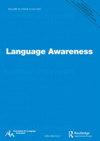合作写作中对形式的注意:第一语言和第二语言使用条件下的语言相关情节
IF 2.2
2区 文学
0 LANGUAGE & LINGUISTICS
引用次数: 5
摘要
摘要先前的研究已经注意到,对语言形式的日益关注是合作写作的诸多好处之一。尽管先前的研究调查了不同的变量(如熟练程度、任务前建模),以促进对形式的关注(通常被视为与语言相关的事件,LRE),但一个关键但未充分探索的变量是,在CW期间,共同的母语是否会影响LRE的使用。研究这个问题有助于理解L1的使用如何影响L2课堂中CW的潜力。本研究考虑了L1和L2使用条件下的LRE。35对英语学习者被要求共同完成两项议论文写作任务。在第一个任务中,一组在L1中交互,另一组在L2中交互。在第二项任务中,小组切换用于互动的语言,并就类似的主题进行写作。结果表明,在共享的L1中进行互动为学习者提供了更多讨论和解决词汇和力学相关问题的机会。此外,处于L1使用条件下的学习者能够以更精细的方式协商语言使用,并使用更广泛的L2词汇。根据这些发现,讨论了连续教学中L1使用的教学意义。本文章由计算机程序翻译,如有差异,请以英文原文为准。
Attention to form in collaborative writing: language-related episodes in L1 and L2 use conditions
Abstract Previous research has noted an increased attention to language form as one of the many benefits of collaborative writing (CW). Although prior studies have investigated different variables (e.g. proficiency, pre-task modelling) to promote attention to form (often operationalized as a language-related episode, LRE), one crucial yet underexplored variable is whether a shared native language affects LRE use during CW. Researching this question informs an understanding of how L1 use influences the potential of CW in L2 classrooms. The present study considers LREs in both L1 and L2 use conditions. Thirty-five pairs of EFL learners were asked to complete two argumentative writing tasks collaboratively. In the first task, one group interacted in the L1 and another group interacted in the L2. In the second task, the groups switched the language used for interaction and wrote on a similar topic. Results showed that interacting in a shared L1 affords learners more opportunities to discuss and resolve lexis and mechanics related issues. Furthermore, learners in the L1 use condition were able to negotiate language use in a more elaborate manner and use a wider range of L2 lexical items. In light of these findings, the pedagogical implications of L1 use during CW are discussed.
求助全文
通过发布文献求助,成功后即可免费获取论文全文。
去求助
来源期刊

Language Awareness
Multiple-
CiteScore
3.70
自引率
10.00%
发文量
18
期刊介绍:
Language Awareness encourages and disseminates work which explores the following: the role of explicit knowledge about language in the process of language learning; the role that such explicit knowledge about language plays in language teaching and how such knowledge can best be mediated by teachers; the role of explicit knowledge about language in language use: e.g. sensitivity to bias in language, manipulative aspects of language, literary use of language. It is also a goal of Language Awareness to encourage the establishment of bridges between the language sciences and other disciplines within or outside educational contexts.
 求助内容:
求助内容: 应助结果提醒方式:
应助结果提醒方式:


